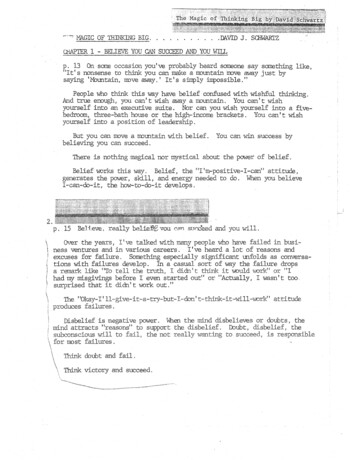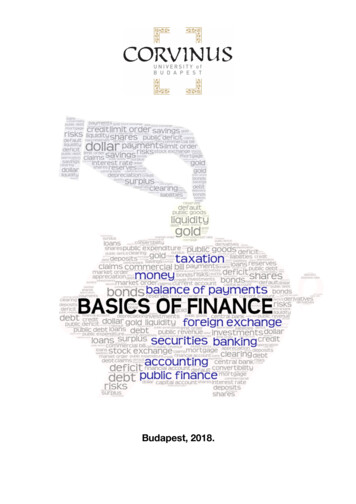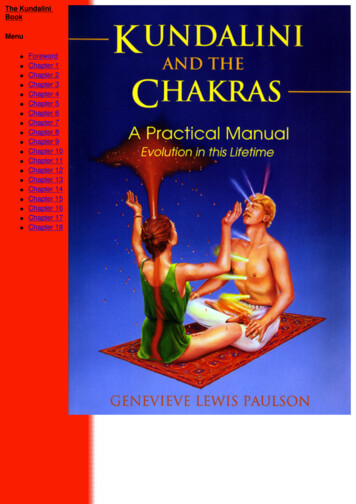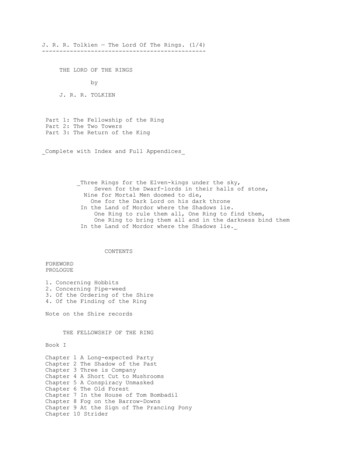
Transcription
THEMAGIC OF THINKING BIG. . .DAVID J. SCHWARTZCHAPTER 1 - BELIEVE YOU CAN SUCCEED AND YOU WIILp. 13 On some occasion you've probably heard someone say something like,"It's nonsense to think you can make a mountain move away just bysaying 'Mountain, move away. ' It's simply impossible."People who think this way have belief confused with wishful thinking.And true enough, you can't wish away a mountain. You can't wishyourself into an executive suite. Nor can you wish yourself into a fivebedroom, three-bath house or the high-incomebrackets. You can't wishyourself into a position of leadership.But you can move a mountainwith belief.believing you can succeed.You can win success byThere is nothing magical nor mystical about the power of belief.Belief works this way. Belief, the "I'm-positive-I-can" attitude,generates the power, skill, and energy .needed to do. When you believeI-can-do-it, the how-to-do-it develops.2.p. 15 Believe, reallybelieve youcansucceed and you will.Over the years, I've talked with many people who have failed in business ventures and in various careers . I've heard a lot of reasons andexcuses for failure. Something especially significant unfolds as conversations with failures develop. In a casual sort of way the failure dropsa remark like "To tell the truth, I didn't think it wouldwork" or "Ihad my misgivings before I even started out" or "Actually, I wasn't toosurprised that it didn' t work out.''The "Okay-I'1 1-give-it-a-try-but-I-don' t-think-it-will-work" attitudeproduces failures.l Disbelief is negative power. When the mind disbelieves or doubts, the/ mind attracts "reasons" to support the disbelief. Doubt, disbelief, thesubconscious will to fail, the not really wanting to succeed, is responsiblefor most failures .\Th.ink doubt and fail.Think victory and succeed.
THE MAGIC OF THINKING BIG . . . . . . . . . . . .DADAVID J. SCHWARTZ3.p . 16 It is well to respect the leader. Leam from him. Observe bim.Study him. But don't worship him. Believe you can surpass. Believe youcan go beyond. Those who harbor the second-best attitude are invariablysecond-best doers.p . 16 Several yearsago after addressing a group of business men in DetroitI talked with one of the gentlemen who approached me, introduced himself,and said, "I really enjoyed your talk. Can you spare a few minutes? I'dlike very much to discuss a personal experience with you."In a few minutes· we were confortably seated in a coffee shop, waitingfor some refreshments."I have a personal experience," he began, "thatties in perfectlywithwhat you said this evening about making your mind w ork for you insteadofletting it work against you. I've never explainedto anyone how I liftedmyself out of the world of mediocrity, but I'd like to tell you about it.""And I' d like to hear it," I said."Well just five years ago I was plodding along, just another guy workingin the tool-and-dietrade. I ma.de a decent living by average standards.But it was far from ideal. Our home was much too small and there was no4.money for those many things we wanted. My wife, bless her, didn't complainmuch, but it was written all over her that she was more resigned to herfate than she was happy. Inside I grew IIDre and more dissatisfied. When Ilet myself see how I was failing my good wife and two children, I reallyhurt inside."But today things are really different," my friend continued. "Today wehave a beautiful new home on a two-acre lot and a year-rotmd cabin a couplehundred miles north of here. There' s no more worry about whether we can sendthe kids to a good college and my wife no longer has to feel guilty everytime she spends money for some new clothes . Next summer the whole family isflying to Europe to spend a month's holiday. We're really living.""How did this all happen?" I asked."It all happened," he continued, "when to use the phrase you used tonight,'I hamessed the power of belief.' Five years ago I leamed about a jobwith a tool-and-die company here in Detroit. We were living in Clevelandat the time. I decided to look into it, hoping I could make a little IIDremoney. I got here early on Sunday evening, but the interview was not untilMonday."After dinner I sat down in my hotel room and for some reason, I gotreally disgusted with myself. 'Why, ' I asked myself, 'am I just a middleclass failure? Why am I trying to get a job that represents such a smallstep forward?'
THE MAGICOF THINKING BIG . . . . . . . . . . . DAVID J. SCHWARTZp. 17 "I don't know to this clay what prompted me to do it, but I took asheet of hotel stationery and wrote down the names of people I've known wellfor several years who had far surpassed me in eaming power and job responsibility. Two were former neighbors who had moved away to fine subdivisions.Two others were fellows I had worked for, and the third was a brother-in-law."Next--again I don't know what ma.de me do this--I asked myselfwhat domy friends have that I don't have, besides better jobs. I compared myselfwith then on intelligence, but I honestly couldn' t see that they excelled inthe brains department. Nor could I truthfully say they had me beat oneducation, integrity, or personal habits."Finally, I got down to another success quality one hears a lot about.Initiative. Here I hated to admit it, but I had to. On this point my recordshowed I was far below that of my successful friends."It was now about 3:00 a.m., but my mind was astonishingly clear. Iwas seeing my weak point for the first time. I discovered that I had heldback. I had always carried a little stick. I dug into myself deeper anddeeper and fomd the reason I lacked initiative was because I didn'tbelieve inside that I was worth very much."I sat there the rest of the night just reviewing how lack of faith inmyselfhad dominated me ever since I could remember, how I had used my mind6.to work against myself. I found I had been preaching to myselfwhy Icouldn't get ahead instead of why I could. I had been selling myself short.I found this streak of self-depreciation showed through in everything Idid. Then it dawned on me that no one else was going to believe in me'until I believed in myself."Right then I decided, 'I'm through feelingsecond-class.in I'm not going to sell myself short.'From here on"Next morning I still had that confidence. During the job interview Igave my new found confidence its first test. Before coming for the interview I'd hoped I would have courage to ask for 750 or maybe even 1,000more than my present job was paying. But now, after realizing I was avaluable man, I upped it to 3,500. And I got it. I sold myself becauseafter that one long night of self-analysis I found things in myself thatmade me a lot more saleable."Within two years after I took that job I had established a reputationas the fellow who can get business. Then we went into a recession. Thismade me still more valuable because I was one of the best business-gettersin the industry. The company was reorganized and I was given a substantialamount of stock plus a lot more pay."Believe in yourself and good things do start happening.5.
THE MAGIC OF THINKING BIG . . . . . . . . . . . DAVID J. SCHWARTZp. 20 Here is the first step toward success. It's a basic step. Itcan't be avoided. Step One: Believe in yourself, believe you can succeed.HOW TO DEVELOP THE POWER OF BEUEFHere are the three guides to acquire and strengthen the power of belief:1. Think success, don't think failure. At work, in your home, substitute success thinking for failure thinking. When you face a difficultsituation, think, "I' 11 win," not "I' 11 probably lose." When you competewith someone else, think, "I'm equal to the best," not "I'm out-classed."When opportunity appears, think "I can clo it," never "I can't." Let themaster thought "I-will-succeed" dominate your thinking process. Thinkingsuccess conditions your mind to create plans that produce s1.lccess. Thinkingfailure does the exact opposite. Failure thinking conditions the mind tothink other thoughts that produce failure.2. Remind yourself regularly that you are better than you think youare. Successful people are not supermen. Success does not require asuper-intellect. Nor is there anything mystical about success. And successisn't based on luck. Successful people are just ordinary folks who havedeveloped belief in thanselves and what they do. Never--yes, never--sellyourself short.8.3. Believe Big. The size of your success is determined by the size of your belief. Think little goals and expect little achievements. Thinkbig goals and win big success . Remember this, too! Big ideas and big plansare often easier--certainlyno more difficult--than small ideas and smal1plans.p. 21 Any training program--and that's exactly what this book is--must dothree things. It must provide content, the what-to-do. Second, it mustsupply a method, the hOW'-to-do-it. And third, it must meet the acid test.That is, get results.The what of your personal training program for success· is built on theattitudes and techniques of successful people. How do they manage thanselves?How do they overcome obstacles? How do they earn respect of others? Whatsets them apart from the ordinary? How do they think?1he how of your plan for development and growth is a series of concreteguides for action. These are found in each chapter. 1hese guides work.Apply them and see for yourself.What about the most inportant part of training: results? Wrapped upbriefly, conscientious application of the program presented here will bringyou success and on a scale that may now look impossible. Broken down intoits components, your personal training program for success will bring youa series of rewards: the reward of deeper respect from your family, the7.
THEM\GIC OF THINKING BIG . . . . . . . . : . . DAVID J. SCHWARTZreward of admiration from your friends and associates, the reward of feelinguseful, of being someone, of having status, the reward of increased incomeand a higher standard of living.Your training is self-administered. There will be no one standing overyour shoulder telling what to do and how to do it. This book will be yourguide, but only you can understand yourself. Only you can command yourselfto apply this training. Only you can evaluate your progress. Only you canbring about corrective action should you slip a little. In short, youare going to train yourself to achieve bigger and bigger success .You already have a fully equipped laboratory in which you can work andstudy. Your laboratory is all aroundYour laboratory consists ofhuman beings. This laboratory supplies you with every possible exampleof human action. And there is no limit to what you can learn once you seeyourself as a scientist in your own lab. What's more, there is nothing tobuy. There is no rent to pay. There are no fees of any kind. You can usethis laboratory as much as you like for free.As director of your own laboratory, you will want to do what everyscientist does: Observe and experiment./ Isn ' t it surprising to you that most people understand so little aboutwhy people act as they do even though they are surrounded by people all\/their lives? Most people are not trained observers. One important/ purpose of this book is to help you train yourself to observe, to developinsight into human action. You' 11 want to ask yourself questions like ''Whyis John so successful and Tom just getting by?" "Why do some people havemany friends and other people have only few friends?" ''Why will peoplegladlywhat onetells themignoreperson whothem the same thing?"Once trained, you will learn valuable lessons just through the veryof observing.are two special suggestions to helpmake yourself a trainedobserver. Select for special study the two most successful and the mostunsuccessful people you know. Then, as the book unfolds, observe how closelyyour successful friend adheres tosuccessNoticehowstudying the two extremes will help you seeunmistakable wisdomfollowing the truths outlined in this book.Each contact you make with another person gives you a chance to seesuccess development principles at work. Your objective is to make successful action habitual. The more we practice, the sooner it becomes secondnature to act in the desired way.Most of us have friends who grow things for a hobby.And we've all heard9.
THE MAGICOF11.THINKING BIG . . . . . . . . . . . DAVID J. SCHWARTZthem say something like "It's exciting to watch those plants grow. Justlook how they respond to plant food and water. See how much bigger theyare today than they were last week.''Tobe sure, it is thrilling to watch what can happen when men cooperatecarefully withnature. But it is not one-tenth as fascinating as watchingyourself respond to your own carefully administered thought managementprogram. It's fun to feel yourself growing more confident, more effective,more successful day-by-day, month-by-month. Nothing--absolutely nothing--inthis life gives you more satisfaction than knowing you' re on the road tosuccess and achievement. And nothing stands as a bigger challenge thanmaking the most of yourself.CHAPTER 2 - CURE YOURSELF OF EXCUSITIS, THE FAILURE DISEASEp. 27 Most of us make two basic errors with respect to intelligence:1. We underestimate our own brain power, and2. We overestimate the other fellow's brain power.p. 28 For, stickability is 95 percent of ability.At a homecoming celebration last year I met a college friend whom I hadnot seen for 10 years. Chuck was a very bright student and was graduated12.with honors. His goal when I last saw him was to own his own businessin western Nebraska.I asked Chuck what kind of business he finally established.''Well," he confessed, "I didn't go into business for myself.I wouldn'thave said this to anyone five years ago or even one year ago, but now I'mready to talk about it.""As I look back at my college education now, I see that I became anexpert in why a business idea won' t work out. I learned every conceivablepitfall, every reason why a small business will fair: 'You've got tohave ample capital;' 'Be sure the business cycle is right;' 'Is there abig demand for what you will offer?' 'Is local industry stabilized?'--athousand and one things to check out.''The thing that hurts most is that several of my old high school friendswho never seemed to have much on the ball and didn't even go to college, noware very well established in their own businesses. But me, I'm justplodding along, auditing freight shipments. Had I been drilled a littlemore in why a small business can succeed, I'd be better off in every waytoday.''The thinking that guided Chuck' s intelligence was a lot more importantthan the amount of Chuck's intelligence.i.'
7 E MAGIC OF 7HINKING BIG. . . . . . . . . . .DAVID J. SC WARTZ13.p. 28 Why some brilliant people are failures . I've been close for manyyea.rs to a person who qualifies as a genius, Zho has high abstract intelligence, and is Phi Beta Kappa. Despite this very high native intelligence,he is one of the most unsuccessful people I know. He has a very mediocrejob (he's afraid of responsibility). He has never married (lots ofmDrriages end in divorce) . He has few friends (people bore him) . He'snever invested in property of any kind (he might lose his mmey). Thisman uses his great brain power to prove why things won't work rather thandirecting his mental power to searching for ways to succeed.CHAP7ER 3 - BUIID CONFIDENCE AND DESTROY FEARp. 44 Why do people fear other people? Why do many folks IHHO self-consciousaround others? What's behind shyness? What can we do about it?Fear of other people is a big fear. But there is a way to conquer it.You can conquer fear of people if you will OHDUQto put them in "properperspective."A business friend, who is doing exceptionally well operating his ownwood-novelty plant, explained to me how he got the proper perspective ofpeople. His example is interesting.14."Before I went into the army in World War II, I was scared of justabout everybody. You just wouldn' t believe how shy and timid I was . Ifelt everyone else was a lot smarter. I worried about my physical andmental inadequacies . I WKRXJKW I was born to fail."Then by some fortunate quirk of fate I lost my fear of people in theDuring part of 1942 and 1943 when the army was inducting men at aterrific clip, I was stationed as a medic at one of the big inductioncenters. Day after day I assisted in examining those men. The PRUH Ilooked at those recruits, the less afraid of people I became.army.''All those men lined up by the hundreds, naked as jaybirds, looked soOh sure, there were fat ones and skinny ones, tall ones andshort ones, but they all were confused, all were lonesome. Just a fewdays before some of these were rising young executives. Some werefarmers, some were salesmen, drifters, blue-collar workers. A few days beforethey had been many things. But at the induction center they were all alike.much alike."I figured out VRPHWKLQJpretty basic back then. I discovered people arealike in many, many PRUHways Wthan they are different. I discovered theother fellow is pretty much like me. He likes good food, he misses hisfamily and friends, he wants to get ahead, he has problems, he likes torelax. So, if the other fellow is basically like me, there's no point inbeing afraid of him."'I
15.THE MAGIC OF 1HlNKING BIG. . . . . . . .Now, doesn't that make sense? If the other fellow is basically likeme, there's no reason to be afraid of him.Here are two ways to put people in proper perspective:1. Get a balanced view of the other fellow. Keep these two points inmind when dealing with people: first, the other fellow is important.Emphatically, he is inportant. Every human being is. But remember this,also. You are important, too. So when you meet another person, make ita policy to think, ''We 're just two important people sitting down toscuss something of mutual interest andb.enefit. ''.hadA couple of months ago, a business executive phoned to tellme heJust employed a young man whom I had recommended to him shortly before./ "Do you know what really sold me on that fellow?" asked my friend. ''What?"I asked. ''Well, it was the way he handled himself. Most job applicantswhen they walk in here are half-scared. They give me all the answers they\ think I want to hear. In a way, most job applicants are a little like\ beggars--they' ll accept anything and they aren't particular.\"But G. handled himself differently. He respected me, but what's justas :important, he respects himself. What' s more, he asked me as manyquestions as I asked him. He's no DDuse. He's a real man and he's goingto do all right.''16.This mutually important attitude helps you keep the situation balanced.The other fellow does not become too :important relative to you in yourthinking.The other fellow might look frightfully big, frightfully :important.But remember, he is still a human being with essentially the same interests,desires, and problems as you.2. Develop an understanding attitude. People who want figuratively tobite you, growl at you, pick on you and otherwise chop you down are notrare. If you're not prepared for people like that, they can punch bigholes in your confidence and make you feel conpletely defeated. Youneed a defense against the adult bully, the fellow who likes to throw hismeager weight around.A few m:mths ago at the reservations desk of a Memphis hotel, I saw anexcellent demonstrationof the right way to handle folks like this.It was shortly after 5 p .m. and the hotel was busy registering newguests . The fellow ahead of me gave his name to the clerk in a commandingway. The clerk said, "Yes sir, Mr. R., we h ave a fine single for you.""Single?" shouted the fellow."I ordered a double."i .
THE MAGIC OF THINKING BIG . . . . . . . . . . . DAVID J SCHWARTZ17.The clerk said, very politely, "Let mecheck, sir." Hepulled theguest' s reservation from the file and said, I m sorry, sir. Your telegramspecified a single. I 'd be happy to put youin a double room, sir, ifwe had any available. But we simply do not.Then the irate customer said,of paper says, I want a double.""I don'tcare what the h--- that piecebit, followed withThen h e s tarted in with that "do-you-know-who-I-am",fir d"I'll have you fired. You'll see, I 11 have you ired .As best he could, under the verbal tornado, theyoung clerk injected,"Sir, we 're terribly sorry, but we acted on your instruction."Finally the customer, really furious now, said, "I wouldn'tstayin thebest suite in this --- ---- hotel now that I know how badly managed it is,"and stormed out.I stepped up to the desk, thinking the clerk, who had taken one of theworst public tongue lashings I' d seen in sometime, would be upset. Instead he greeted me with one of the finest Good evening, sir s I. d everhd As he went through the routine of processing my room, I said to"I certainly admire the way you handled yourself just a moment ago.'You have tremendous temper contro1 . "18."Well, sir," he said, "I really can' t get mad at a fellowtbat. Yo1 u'see,reallyt mad at me. I was just the scapegoat. The poor fellowmay be in bad trouble with his wife, or his business may be off, or maybehe feels inferiorthis was his golden chance to feel like a wheel. I'mjust the guy who gave him a chance to get something out of his system."The clerk added,are.""Underneathhe's probably aguy.Walking towardelevators, I caught myself repeating aloud, 'Underneathhe 's probably a very nice guy. Most folks are. "Remember those two short sentences next time someone declares war on you.yourway to win inlike thisto let the otherfellow blow his stack, and then forgetyearscheckingpapers , I came acrossone that especially disturbedme. The student who wrote the examinationhad demonstrated in class discussions and previous tests that he was farbetter qualified than his paper indicated. He was, in fact, the fellow whoI thought would finish at the top of the class. Instead his paper put himat the bottom. AS was my custom in such cases, I had my secretary call thestudent and ask him to come by my office on an urgent matter.Paul W. appeared shortly. He looked as though he had been through aterribleAfter he was comfortably seated, Ito him,
THE MAGIC OF THINKING BIG . . . . . . . . . . .DADAVID J. SCHWARTZ"Whathappened,write."Paul?19.This just isn't the quality paper I expected you toPaul struggled with himself, looked in the direction of his feet andreplied, "Sir, after I saw that you had spotted me cheating, I just wentto pieces. I couldn't concentrate on anything. Honest, this is the firsttime I've ever cheated at the University. I desperately wanted an A, soI worked up a little pony to use."He was terribly upset. But now that he was talking, he wouldn't stop.''I suppose you' ll have to recommend me for dismissal. The University rulesays any student found cheating in any manner is subject to permanent dismissal.''Here Paul started bringing up the shame this incident would bring to hisfamily, how it would wreck his life, and all sorts of repercussions.Finally I said, "Hold it now. Slow down. Let me explain something. Ididn' t see you cbeat. Until you walked in and told me, I hadn't thefaintest idea that was the trouble. I am sorry, Paul, that you did."Then I continued, "Paul, tell me, just what do you want to gain fromyour University experience?"20.He was a little calmer now and after a short pause he said, ''Well,Doctor I think my over-all aim is to learn how to live, but I guess I'mfailing pretty badly."''We learn in different ways," I said.success lesson from this experience.""I think you can learn a real"When you used your pony in there, your conscience bothered you terribly.This gave you a guilt complex that in turn broke your confidence. As youexpressed it, you went to pieces.''Most of the time, Paul, this matter of right and wrong is approachedfrom a moral or religious standpoint. Now understand, I'm not here to preachto you, give you a sermon about right and wrong. But let's look at thepractical side. When you do anything that goes contrary to your conscience,you feel guilty and this guilty feeling jams your thought processes. Youcan't think straight because your mind is asking, 'Will I get caught? WillI get caught?'"Paul," I continued, "you wanted an 'A' so badly you did something youknew was wrong. There are many times in life when you' 11 want to make an'A' so badly you'll be tempted to do something that is contrary to yourconscience. For example, some day you may want to make a sale so badly you'llthink of deliberately misleading the customer to buy. And you may succeed.But here's what will happen. Your guilty feeling will grab hold of youand the next time you see your customer, you'll be self-conscious, ill at
'THEMAGICOF THINKING BIG . . . . . . . . . . . DAVID J. SCHWARTZ21.ease. You'll be wondering, 'Has he discovered that I put something over?'Your presentation will be ineffective because you can't concentrate.Chances are you' 11 never make the second, third, fourth, and the manyrepeat sales. In the long run, making that sale using tactics that hurtyour conscience will cost you a lot of income."I went on and pointed out to Paul how an occasional business or professional man loses his grip because of an intense fear that his wife willlearn about a secret love affair he is having with another woman. "Willshe find out? Will she find out?" eats away the man's confidence untilhe can't do a good job at work or in the home.I reminded Paul that many criminals are captured not because any cluespoint to them but because they act guilty and self-conscious. Theirguilt feeling puts them on the suspect list.There is within each of us a desire to be right, think right, and actright. When we go against that desire we put a cancer in our conscience.This cancer grows and grows by eating away at our confidence. Avoid doinganything that will cause you to ask yourself, "Will I get caught? Willthey find out? Will I get away with it?''Don 't try to make an "A" if it means violating your confidence.Paul, I'm pleased to say got thiof doing what 's right. I then proposepoint. . He d learned the practical valueIn answer to his question "But what abohe sit down and retake the examination.what the regulations say about ch t. a ou my ismissal?"I said, "I know.all students who have cheated in eatiing. But,you know, if we dismissed. . Andwe dismissed a11 st y wayathe professors would have toUniversi ty would have to shut students who thought about cheating,"So, I m forgetting this whole incident if you' 11 do me a favor."I walked over to my bookshelf took dWith the Golden Rule and said "Paulownd my personal copy of Fifty Yearshow , . ini J . Cc. Penney's,, rea this book and return it. senney' s own words 'twhat's.eeAmerica 's richest men."at smadeone ofDoing what's right keeps yo.self-confidence. When we do whatconsciencet satisfied. And this buildshappen. First, we feel guilt and th. owne wrong, two negative thingsother people sooner or later find o is guilt eats awayconfidence. Second,u anose confidence,us.Do what's right and keep your confidence.success.That's thinking yourself too
THEMAGIC OF THINKING BIG . . . . . . . . . . . DAVID J. SCHWARTZP. 48 Here is a psychological principle that is worth reading over 25times. Read it until it absolutely saturates you: To think confidently,act confidently.The great psychologist, Dr. George W. Crane, said in his famous book,APPLIED PSYCHOLOGY (Chicago: Hopkins Synidicate, Inc., 1950) "Remember,motions are the precursors of emotions. You can't control the latterdirectly but only through your choice of motions or actions .TTo avoidthis all to conman tragedy (marital difficulties and misuriderstandings)become aware of the true psychological facts. Go through the proper motionseach day and you'll soon begin to feel the corresponding emotions!Just be sure you and your mate go through those IIi.otions of dates andkisses, the phrasing of sincere daily compliments, plus the many otherlittle courtesies, and you need not worry about the emotion of love. Youcan't act devoted for very long without feeling devoted."Psychologists tell us we can change our attitudes by changing ourphysical actions. For example, you actually feel more like smiling if youmake yourself smile. You feel more superior when you make yourself standtall than when you slouch. On the negative side, frown a really bitterfrown and see if you don't feel more like frowning.It is easy to prove that managed motions can change emotions. Peoplewho are shy in introducing themselves can replace this timidity with24.confidence just by taking three simple actions simultaneously: First, reachfor the other person's hand and clasp it warmly. Second, look directly atthe other person. And third, say, "I'm very glad to know you."These three simple actions automatically and instantaneously banishshyness. Confident action produces confident thinking.So, to think confidently, act confidently. Act the way you want to feel.Below are five confidence-building exercises. Read these guides carefully.Then make a conscious effort to practice them and build your confidence.1. Be a front seater. Ever notice in meetings--in church, classrooms,and other kinds of assemblies--how the back seats fill up first? Most folksscramble to sit in the back rows so they won't be "too conspicuous." Andthe reason they are afraid to be conspicuous is that they lack confidence.Sitting up front builds confidence. Practice it. From now on make ita rule to sit as close to the front as you can. Sure you may be a littlemore conspicuous in the front but remember there is nothing inconspicuousabout success.2. Practice making eye contact. How a person uses his eyes tells us alot about him. Instinctively, you ask yourself questions about the fellowwho doesn't look you in the eye. ''What's he trying to hide? What's heafraid of? Is hetrying to put something over on me? Is he holding something back?"23.
THEMAGIC OF THINKING BIG . . . .
2. THEMAGIC OF THINKING BIG. . . .DAVID J. SCHWARTZ CHAPTER 1 - BELIEVE YOU CAN SUCCEED AND YOU WIIL p. 13 On someoccasion you've probably heard someone say something like, "It's nonsense to think you can ma










